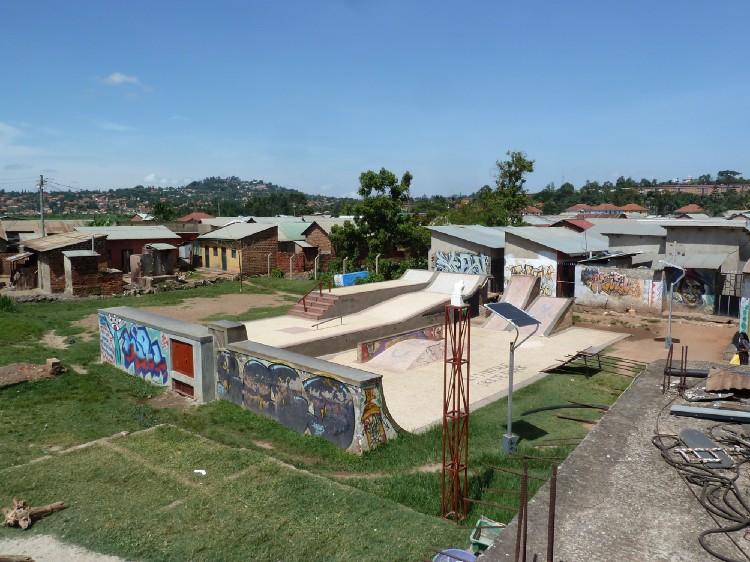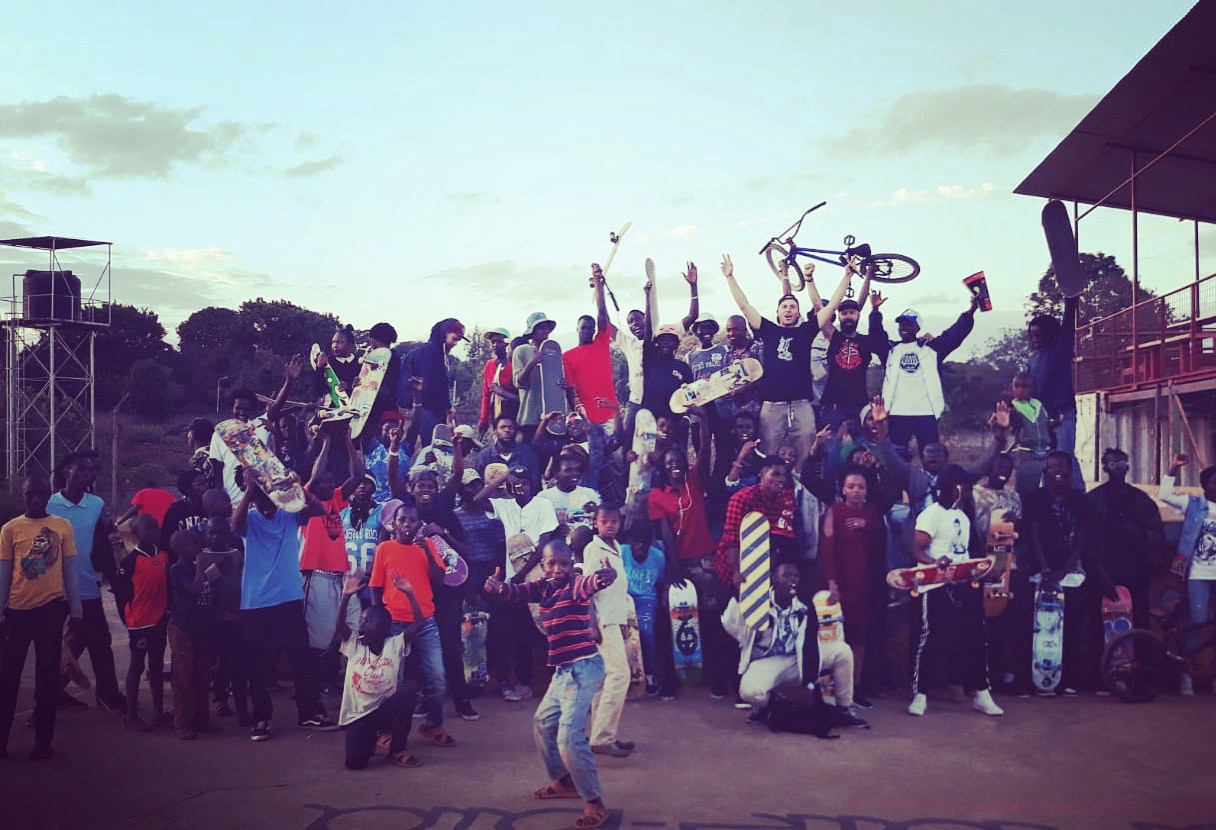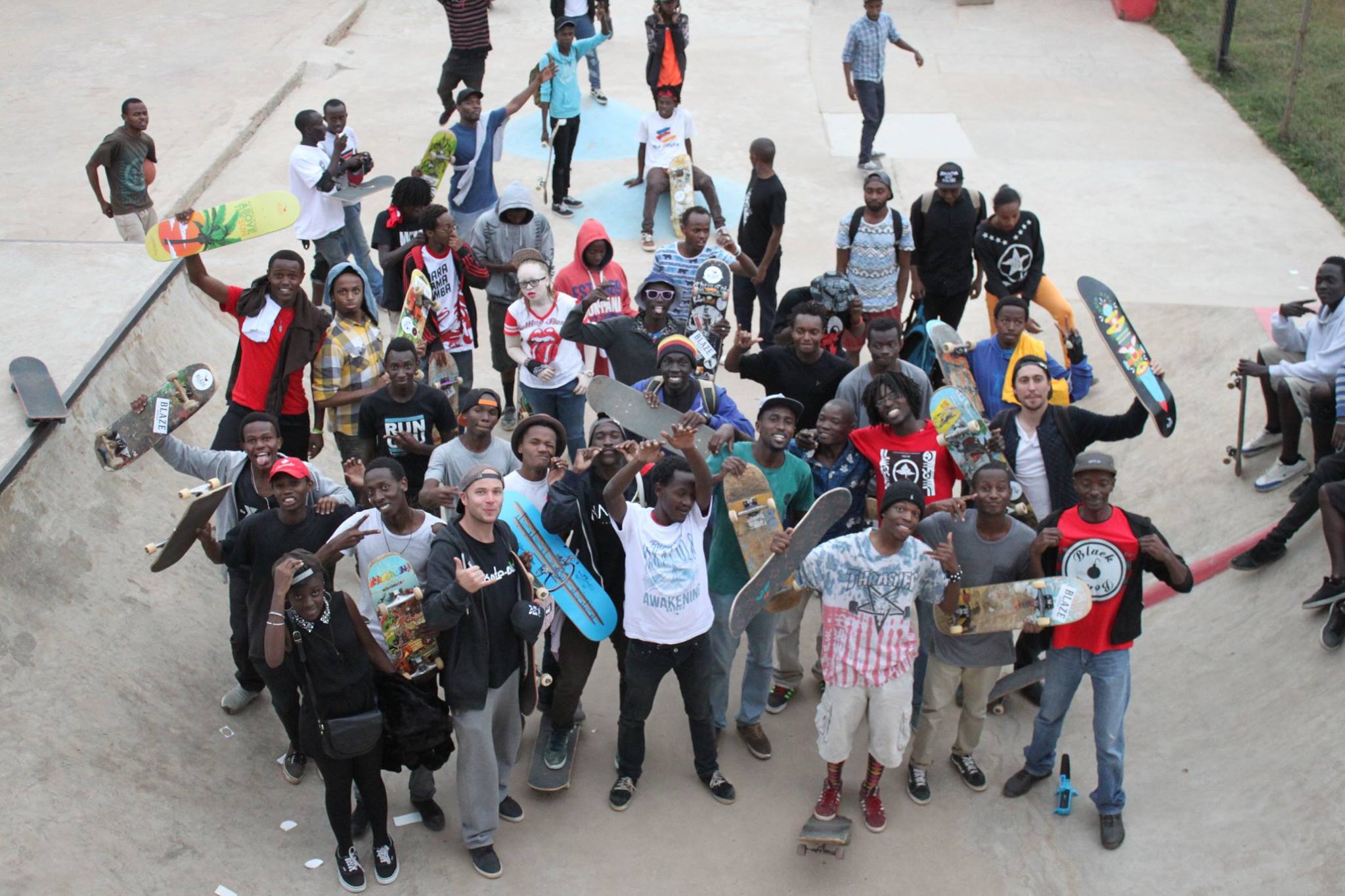Skateboarding Culture is spreading in (East-) Africa and local initiatives are more and more supported by the international skateboarding community and organizations.
Skateboarding began in West Coast America in the 1960s. At times of the year when the surf wasn’t up, pioneers attached roller skates to the underside of their surfboards, allowing them to cruise the beach promenades and streets instead. Before long this idea turned into a movement that inspired thrill-seekers to drop in on empty pools and sidewalks. While several trends swept parts of Europe, North and South America and Asia about four decades ago, it took longer to reach East Africa, where one of the skateboarding pioneers is Jackson Mubiru from Kampala. With friends,he built his first concrete halfpipe in 2004 in the Kitintale suburb of Kampala. At this time, skateboarding hadn’t yet become popular in Africa and nobody could have predicted that this young man and his passion would inspire youngsters all over Uganda and in neighbouring Tanzania, Kenya and Rwanda.
Skateboarders are like one big global family, sharing the lessons of life on their skateboards
At a time when people around the world may seem to be getting more selfish and lacking in empathy, skaters have a different connection. “On a board, everyone is equal and skin colour doesn’t matter any more,” explains Jackson. “Skateboarding brings people together from different tribes, backgrounds and economic statuses. Some people thought we were crazy and actually laughed at us for bringing skateboards to children who have more urgent needs like food and clothing. But the action and impact speaks louder than words.
Uganda

What began in 2004 as the passion of an individual and his friends is today an established project named the Uganda Skateboard Union, raising its third generation of children to young adults. East African park skating (as opposed to street skating) began in Uganda in 2004 when South African student Shael Swart teamed up with Jackson Mubiru to build a miniramp in Kitintale. The venture was entirely self-built and self-funded. They persuaded a local department store to donate a couple of skateboards to the park so the kids could join in. From the outset, the Uganda Skateboard Union involved the participation of kids living nearby. Once built, it served the dual purpose of being a spot where the older boys could skate as well as providing an opportunity for those less fortunate to get started. This year, with the help of international partners, the project includes a world-class skatepark with an office, workshop and solar lights. It’s mainly the central place for self-empowerment in Kitintale and also one of the safest places to hang out, train, practise and chat after dark. East Africa’s first skatepark is free for everyone to have a good time.
Kenya

Until the last 10 years Nairobi’s urban infrastructure, with its potholes, bumpy roads and few sidewalks, wasn’t exactly a smooth ride. Today, roads and pavements are in better shape and after several months of intense do-it-yourself construction work funded by the German NGO Skate-Aid with the enthusiastic help of local skateboarders, the dream of Kenya’s first skatepark became a reality as Shangilia Skatepark opened in October 2013. At 1,200 square metres, it’s East Africa’s largest skatepark, boasting a bowl, a mini-ramp and a street section with boxes and rails as well as a basketball court and viewing platform. The park is located on the property of the Shangilia School of Performing Arts. Since most of the visitors attend the Shangilia Children’s Home orphanage, the park acts rather as a playground than a skate spot. It’s a place for the children to experience something new, to overcome their doubts and most importantly to enjoy their time. Nowadays you can find local skateboarders mainly at Uhuru Park, at the Shangilia Skatepark and, for beginners, at the upcoming skate facilities at shopping malls in the capital. There are more skateboarders in other cities, too, and there’s even a ‘secret skatepark’ at the amazing Kinondo Kwetu Beach Hotel near Diani Beach. The Skateboarding Society of Kenya is organising the Kenyan skateboarding scene in order to lobby on behalf of its members. Many local initiatives and start-ups like Sidekick Magazine, the Wanderer Skateshop and Nairobi´s first Extreme Sports School are also creating a small income and hopefully future job and business opportunities for the skaters.
Rwanda

Kigali, the city with the thousand hills, is a paradise for longboarding and cruising with your skateboard. In 2016 Skate-Aid built the country’s first skatepark at the SOS Children’s Village in Kigali.
Tanzania
There are quite a few skateboarders across Tanzania and there’s a skatepark in the capital, Dodoma; but the local skateboarding scene doesn’t seem quite as big as in Kenya or Uganda. There are local initiatives and skateboarding blogs and if you visit Dar es Salam you’ll meet skateboarders in the suburbs.
Ethiopia
Ethiopias Capital Addis also got his first skatepark by a global network of skateboarding activists, which fundraised for the construction materials and all came together in 2017 to build the countries first skatepark open to the public.Addis Skatepark was constructed in April, 2016 in collaboration with Make Life Skate Life, a non-profit organization that works with local skateboarding communities to create free of charge, community-built concrete skateparks around the world. The activists worked alongside a team of over 60 volunteer skatepark builders and skateboarders from over 20 countries around the world as they collectively constructed Ethiopia’s first skatepark.


